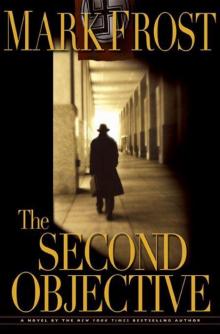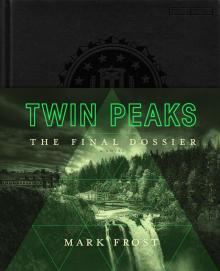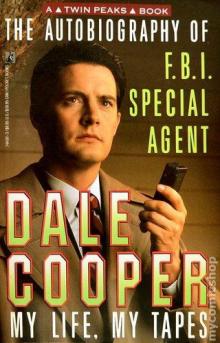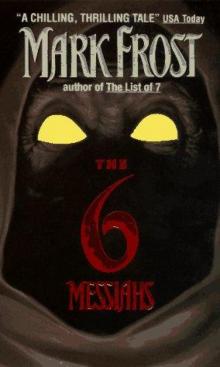- Home
- Mark Frost
The Six Messiahs Page 3
The Six Messiahs Read online
Page 3
In the midst of conversation the two men glanced his way; he casually moved his gaze to a passing woman, tipping his hat. When he looked back, their attention had not fixed on him; they were walking away, still absorbed in their discussion.
He watched them retreat. Finding their cabins was next. Then he would involve the others.
He tossed his cigarette over the side and strolled after the two men.
They were making it easy for him.
AT SEA, APPROACHING SAN FRANCISCO
Half a world away, from the deck of another ship—the Canton, a squalid tramp steamer, carrying only steerage class, a bucket of rust bound from Shanghai—as it sailed east and entered the straights that opened into another great deepwater port, a man stood quietly alone at the starboard rail, silently intoning a prayer as he watched the rounded headlands of a strange country draw near. A hoard of impoverished, ragtag immigrants swarmed around him, cheering as the mythical land of plenty glided into view. After enduring two weeks belowdecks in a pestilent hellhole of contagion and crime, it seemed for the first time conceivable that the gamble they'd made with their lives might have been worth the taking.
The man stood alone near the center of the pack, yet none of the others pressed in or jostled him. He was of moderate size, unextraordinary appearance, and occupied little space himself, but when he so desired it that space was never violated. Neither young nor old, nothing about him lingered long in one's memory: Even here, in the middle of an alert and agitated mob, his presence hardly registered. This was one of his most practiced abilities; to leave a hole in the air, rendering himself virtually invisible whenever the situation demanded. Yet even then he was left alone; the respect he commanded was granted to him unconsciously.
His parents and natural family were as unknown to him as these strangers on deck; no given name had followed him when he' was abandoned in an alley after birth. He had early on displayed such a self-reliant and single-minded strength of will that the brothers of the monastery who had raised the boy from infancy named him Kanazuchi—"the Hammer."
When the ship docked and they passed through immigration in San Francisco, no official would question that he was anything other than what he appeared to be: one of four hundred indigent Chinese laborers from Quongdong province on the Mainland. With his shaved forehead and topknot queue, he knew he could depend on the white man's inability to distinguish one Asian face from another.
That he was Japanese, a race of people still seen only rarely in this country, would not occur to a single one of them. That he was a Holy Man from an ancient monastic order on the island of Hokkaido was unimaginable.
That he was one of the most dangerous men alive he could rest assured was an idea that would never take shape in the mind of a single living being.
Kanazuchi ended his meditation with a grace that pleased his keen sense of aesthetic balance. As the ship sailed closer to America, the visions that had plagued his dreams for the last three months had grown more disturbing than ever before; only these meditations had any calming effect.
The agitation on deck increased; the outskirts of a city drawing closer on the rolling green hills. Shifting the light, oblong bundle on his back, Kanazuchi wondered if he would be asked to open it for inspection as they cleared immigration. Many of the skilled workers on board—carpenters, masons—had carried their tools along with them. Perhaps they would all be allowed to pass without having to display their belongings; if not he would find a way to avoid the authorities.
Kanazuchi was prepared. He had come too far. His mind was closed to the possibility of failure. And he knew that if anyone saw the sword concealed in his bundle, he would have to kill them.
chapter 2
"My name is Werner. If there is anything I must do to make your voyage more comfortable, please you will let me know."
"Thank you, Werner."
Doyle made to enter his cabin but Werner blocked his way.
"If I might be so bold: I have read about your famous detective, sir, and I would like to demonstrate that the great Mr. Holmes is not alone in his power of the deductive capability," said the dapper German steward in his crisply accented English.
"Fine. How do you wish to do this?" said Doyle politely.
' 'I have observed you for only a few moments, you agree, yes?"
"I cannot dispute you."
"And yet I am able to tell you that from within the last year you have traveled to Cherbourg, Paris, Geneva, Davos, Marienbad, back to London, once to Edinburgh, and twice to Dublin. Will I not be correct, sir?"
Doyle had to admit that he was.
"And would you like me to tell you how I have reached this conclusion, sir?"
Doyle was compelled to admit that he would.
"I have looked at the labels on your luggage."
Werner winked, wiggled his little blond moustache, gave a smart salute, and slipped smoothly down the passageway. Doyle had just begun to unpack when Innes rushed into the cabin, knocking off his derby on the doorway overhead.
"Smashing good news," said Innes, retrieving his hat. "I've found someone who'll be of tremendous help to us when we reach New York."
"Who's that, Innes?"
"He gave me his card. Here," he said, producing it. "His name is Nels Pimmel."
"Pimmel?"
"A reporter for the New York Post. You'll be ever so amused by the fellow, Arthur. He's what you would call a real 'character.' ..."
"Let me see that," said Doyle, taking the card.
"And a most agreeable chap. Seems he has the acquaintance of nearly everybody who's anybody in the entire United States...."
"And what did Mr. Pimmel want from you?"
"Nothing. He's invited us to dine with him tonight."
"You didn't accept of course."
"I didn't see the harm in it.. .."
"Innes, listen to me carefully; you are not to seek out, speak to, or encourage this man's advances from this moment forward in even the slightest way."
"I don't know why; he's a perfectly pleasant sort of bloke."
"This man is not a bloke, chap, or any other sort of regular person; he's a journalist and they are a breed apart."
"So you immediately assume he must be cultivating my friendship only so he can get closer to you, is that it?"
"If this is the man I think it is, be assured he is not remotely interested in your friendship or even your passing acquaintance. ..."
Two small spots of red appeared on Innes's cheeks and his pupils contracted down to pinpricks—oh dear, thought Doyle, how many times have I seen those dependable beacons of distress before.
"So what you're saying is I'm ridiculous to assume that anyone might take a genuine interest in me alone as a human being...."
"Innes, please, that's not what I'm saying at all."
"Oh, really?"
"There are different rules for social intercourse on board ship. This Pimmel or Pinkus or whatever his name is has al-ready accosted me once. Give him one inch of encouragement now before we've left sight of land and the man will be living in our pockets for the remainder of the cruise."
"Do you want to know what I think?" said Innes, bouncing up on his toes, voice rising alarmingly in pitch. "I think you've read too many of your press clippings. I think you think you're better than other people. I'm twenty-four years old, Arthur, and I may never have been on a ship before, but that doesn't mean I've forgotten my manners and I shall speak to or dine with whomsoever I choose."
Punctuating the impact of his outburst with a dramatic exit, Innes turned to go and threw open the door to the closet. To his credit, he kept his composure, gave the contents of the closet the once-over as if that had been his original intent, slammed the door with a satisfied grunt, and swept out of the cabin, knocking his hat off on the overhead again for good measure.
Five months without Larry, thought Doyle. Good Christ, I'll never make it back to England alive.
That evening, Doyle dined at the tabl
e of Captain Karl Heinz Hoffner unaccompanied by his younger brother, who took his first meal at the far end of the elegant hall, in the company of Ira Pinkus/Nels Pimmel and the other four pseudonyms under which Pinkus plied his trade for six different New York newspapers. Pinkus/Pimmel expressed glancing disappointment that Innes's illustrious brother would not be joining them, but then a worm doesn't eat its way to the center of the apple by starting at the core.
Infuriated by Arthur's snobbery, Innes experienced no misgivings afterward about the full menu of Conan Doyle anecdotes he trotted out for Pimmel as the meal progressed—what was the harm in it? Wasn't as if the man was openly interrogating him, and he seemed every bit as engrossed by Innes's own escapades with the Royal Fusiliers as he was about anything to do with the life and times of the Great Author. And Pimmel himself proved supremely entertaining on the subject of New York, particularly his intimate and apparently inexhaustible lowdown on Broadway show girls.
Why, no, it wouldn't be any trouble at all to introduce you to some of these gals, Pimmel assured him. Say, here's an idea: Why don't the two of us go out on the town one night with a great big bunch of them? Better yet, we'll throw a party! Let them come to us! Have a little more wine, Innes!
Outstanding fellow, Pimmel.
Realizing he was expected to spend every evening of the cruise with Captain Hoffner—a stolid pillar of a man singularly preoccupied with maritime statistics, shipboard etiquette, and the tide tables, all untainted by the slightest hint of humor—Doyle rolled out the questions he'd dreamed up about the Elbe at a measured pace, hoping the Captain's replies might buy enough time to root out other areas of conversational fertility. But Hoffner's answers lacked wind; they were as precise, as streamlined, and about as riveting as an engine manual recited by a myna bird. The man had spent so much of his life at sea he had failed to acquire an opinion on any unseaworthy subject and had apparently never even cracked open a novel. Certainly none of Doyle's, at any rate.
Fellow guests at the table weren't much help, either; a congregation of beer executives from Bavaria and their well-groomed wives, off for a pleasure tour of midwestern American breweries. All in possession of modestly serviceable English that they chose for the most part not to exercise, spending the better part of the meal hanging on Doyle's every word as if each utterance contained hidden religious significance: Sherlock Holmes was Big Business in Germany.
The Famous Author syndrome usually provided sufficient inspiration to hoist Doyle into the saddle of some pet high-horse of his, but tonight every time he rolled up to the edge of a really first-rate pontification the sight of Innes huddling with Pinkus/Pimmel across the room knocked him right off his perch. He felt as dull and becalmed as the glacial Captain Hoffner. As the lapses between exchanges became longer and grimmer, the screech of cutlery grinding on china grew deafening.
"I remember reading somewhere that you have an enduring interest in the occult, Mr. Doyle," said the lone English woman at the table, who had until that moment maintained a watchful silence.
Indeed he had, replied Doyle. An interest tempered by a natural and healthy skepticism, he was quick to add.
Glum faces around the table assumed new life. The burghers' wives ganged up on Hoffner with a hard flurry of German, attempting to prod him to some unknown action involving Doyle. Hoffner held his ground during the brief, one-sided engagement before turning to Doyle with a look of deeply felt apology.
"I have been telling a story last night at dinner as we crossed the Channel," said the Captain. "It seems some of my crew are convinced we are having a ghost on board."
"The ship is haunted," said the English woman.
She roosted on the edge of her chair, small and birdlike, and throughout the meal he hadn't taken much notice of her, but now that she had set foot in her element, Doyle recognized that slightly deranged sparkle in her pale eyes: She was a True Believer.
"I am afraid that I cannot say this is true with any assurance, Mrs. Saint-John," said Captain Hoffner. Then to Doyle, again apologetically: "We have been having over a period of some years on board the Elbe a series of strange and ... unexplainable occurrences."
"Why don't you tell Mr. Conan Doyle about your most recent episode, Captain?" said Mrs. Saint-John, flashing a nervous smile, eyes blinking rapidly.
"This has happened earlier this evening," said Hoffner with a shrug, lowering his voice.
"After we set sail?"
Hoffner nodded sharply. "A passenger hears some strange noises from the cargo hold; a series of shrieking cries, a repeated knocking sound...."
"Any other witnesses?" asked Doyle.
"No; just this one woman," said Hoffner.
"It is a classic haunting," said Mrs. Saint-John, her hands nervously fidgeting her napkin ring. "I'm sure you would agree with my diagnosis, Mr. Conan Doyle; footsteps in an empty hall, thumps, raps, mournful voices. And a sighting of a large, looming gray figure in a cargo hold passageway."
"None of this I am ever seeing myself, you understand," said Hoffner, minimizing; there was clearly no room for a bona fide ghost on his ship.
"Captain, have there been any tragedies aboard the Elbe?" asked Doyle.
"This ship is now ten years at sea; I am sailing with her every one of those days. Whenever there is such a regular gathering of human lives tragedy must inevitably, sadly, play a part in the experience," said Hoffner.
"Sadly true," said Doyle, surprised at how near Hoffner's observation had approached eloquence. "Are there any that stand out particularly? Any violent murders or brutally memorable suicides?"
The burghers and their wives seemed slightly taken aback.
"Pardon my bluntness, ladies and gentlemen, but there's no point in our mincing any words; phenomena of the sort described by Mrs. Saint-John usually result from some terrible unhappiness that cannot be wished away by our tiptoeing around the facts in the interest of propriety."
At last, thought Doyle happily, a subject I can take to the bank.
"In former times," the Captain said cautiously, "there have been a few such instances."
"Just so; I shan't trouble you over mixed company at dinner for the details. I'll offer one interesting theory about ghosts, meine Damen und Herren, and the most credible to my way of thinking if you credit the phenomenon at all: The specter constitutes the emotional residue of a life that ended unexpectedly or in great spiritual confusion—this is why sightings are frequently related to murder or accident victims, or suicides—the equivalent, if you will, of a footprint left on a sandy beach, a remnant that lives on outside our perception of time, with no more actual connection than that footprint has to the person who leaves it behind...."
"Oh no. No, no, no; what one encounters is the immortal soul of the poor unfortunate itself," said Mrs. Saint-John. "Trapped between heaven and earth, in a purgatorial void...."
"That is another point of view entirely," said Doyle, annoyed to have been so aggressively knocked off his rails. "One I'm afraid I cannot wholeheartedly endorse."
' 'But I can assure you, Mr. Conan Doyle, that this is indeed the case. It has been our experience with them time and again...."
"Our experience?"
Mrs. Saint-John smiled assuredly at the other guests. "I refer to my companion, largely, and myself to a much more limited degree."
"Companion."
Oh dear; not one of those invisible spirit guides that certain slightly hysterical middle-aged women allege to have trotting around after them like a Pekingese dog. Definitely a nutter, thought Doyle.
"I'm afraid Sophie wasn't feeling well enough to join us for dinner tonight," said Mrs. Saint-John. "She's just completed an exhausting lecture tour of Germany and we're traveling on to America without a stop at home."
"It sounds as if you and your friend are very much in demand," said Doyle, relieved that at least her "friend" currently resided in a human body.
"Yes. We were introduced three years ago, not long after my husband died. I was quit
e naturally bereft. Inconsolable, really, because I felt then very much like you apparently do now, Mr. Conan Doyle: that my dearest Benjamin was simply gone. And then, in my despair, a close friend insisted that I must meet Sophie. Sophie Hills."
"The Sophie Hills."
"Ah, so you are familiar with her."
Sophie Hills was the most celebrated, if not notorious, psychic-medium in England of the moment. The woman claimed to be attended by a vast congregation of disembodied spirits, all with direct links to the central switchboard of the hereafter, which time and again had coughed up on request verifiably accurate information about dead relatives, lost envelopes, missing engagement rings, mysterious medical ailments, and, in one sensational instance, a revelation about an unsolved decade-old crime in Heresfordshire that resulted in a confession of murder. Sophie occasionally demonstrated the peculiar talent of apport mediumship, the ability to manifest out of thin air three-dimensional objects as oddly diverse as African bird nests, ancient Roman coins, and exotic—still flopping—fish. Her puzzling faculties had been subjected to exhaustive tests by the scientific community and to date not a single reasonable doubt had been confirmed as to their authenticity. In one such instance, before credible witnesses, while strapped into a strait-jacket and wearing a gunnysack on her head, under the guidance of Miss Hills one of her spirit guides played ' 'Turkey in the Straw" on an accordion stashed across the room under a bushel basket.
Oh yes, Doyle was familiar with Sophie Hills. And more than passingly interested in a chance to have a whack at the old girl in action.
"I have proposed to Mrs. Saint-John," said Captain Hoffner, "that one night during our crossing we might impose upon Miss Hills to give a demonstration of her powers."
"And in so doing put to rest the tormented spirit that haunts the good ship Elbe," said Mrs. Saint-John. "After hearing that you were to sail with us, it was my suggestion that we solicit your participation, Mr. Conan Doyle. And if you were to find such a demonstration of sufficient scientific rigor, the strength of your reputation could go a long way towards persuading the general public of the goodness of Sophie's powers."

 Rogue
Rogue The Second Objective
The Second Objective Alliance
Alliance Twin Peaks: The Final Dossier
Twin Peaks: The Final Dossier The Paladin Prophecy
The Paladin Prophecy Game Six: Cincinnati, Boston, and the 1975 World Series: The Triumph of America's Pastime
Game Six: Cincinnati, Boston, and the 1975 World Series: The Triumph of America's Pastime The List of Seven
The List of Seven The Autobiography of FBI Special Agent Dale Cooper
The Autobiography of FBI Special Agent Dale Cooper The Six Messiahs
The Six Messiahs The Secret History of Twin Peaks
The Secret History of Twin Peaks Paladin Prophecy 2: Alliance
Paladin Prophecy 2: Alliance Game Six
Game Six